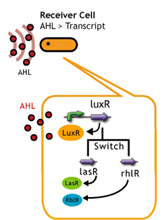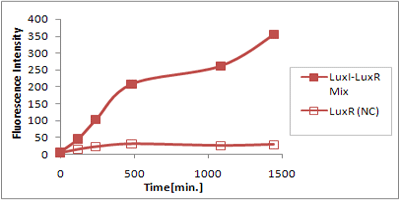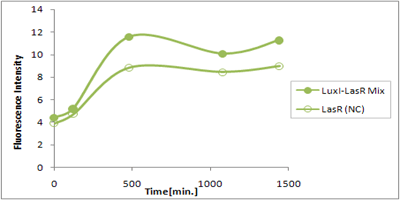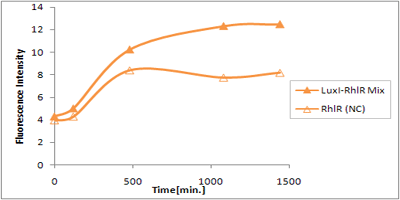Team:Chiba/Project/Experiments:Receiver Crosstalk
From 2008.igem.org
(→Receiver Cross-talk) |
(→Result & Discussion) |
||
| (56 intermediate revisions not shown) | |||
| Line 1: | Line 1: | ||
<html><link rel="stylesheet" href="https://2008.igem.org/wiki/index.php?title=User:Maiko/chiba.css&action=raw&ctype=text/css" type="text/css" /></html> | <html><link rel="stylesheet" href="https://2008.igem.org/wiki/index.php?title=User:Maiko/chiba.css&action=raw&ctype=text/css" type="text/css" /></html> | ||
| - | [[Image:Chiba-U.gif]] | + | [[Image:Chiba-U.gif|center]] |
{| style="color:white;" cellpadding="3" cellspacing="3" border="0" width="100%" align="center" class="menu" | | {| style="color:white;" cellpadding="3" cellspacing="3" border="0" width="100%" align="center" class="menu" | | ||
!align="center"|[[Team:Chiba|Home]] | !align="center"|[[Team:Chiba|Home]] | ||
| Line 13: | Line 13: | ||
==Receiver Cross-talk== | ==Receiver Cross-talk== | ||
===Design=== | ===Design=== | ||
| + | |||
{| style="border:0px;" cellpadding="5px" | {| style="border:0px;" cellpadding="5px" | ||
| + | | width="50%" valign="top" | | ||
| + | [[Image:Receiver switch chiba.jpg|frame|left|'''Fig. 1 Crosstalk''']]<br clear=all> | ||
| width="50%" valign="top" | | | width="50%" valign="top" | | ||
| - | + | [[Image:Table R chiba.gif|frame|left|'''Table 1 LuxR family gene. '''Data modified from M.RIVAS et.al. Biol Res 38: 283-297, (2005)''']] | |
| - | [[Image: | + | [[Image:Lux box Chiba.jpg|frame|left|'''Table 2 Comparison of the predicted Lux box. '''Data modified from A.Fekete et.al. Anal Bioanal Chem 387:455–467,(2007)''']] |
| - | + | | width="50%" valign="top" | | |
| - | + | ||
| - | + | |} | |
| + | |||
| + | In this plan, we induce cross-talk of quorum sensing by changing receiver protein. It is known that receiver proteins can work with the stimuli of signaling molecule even from another species of bacteria (See Table. 1).[[Team:Chiba/Project#references|<sup>(1)</sup>]][[Team:Chiba/Project#references|<sup>(2)</sup>]]。<br> | ||
| + | These endo-genieous combination of signaling molecules and receiver proteins causes the delay of response time and as a result the gene expression triggered by quorum sensing device is to be delayed. | ||
<br> | <br> | ||
| - | + | For instance, receiver proteins, RhlR and LasR (from <i>Pseudomonas aeruginosa</i>) is stimulized by 3OC6HSL. | |
| + | <br clear=all> | ||
| + | |||
| + | |||
| + | In addition, LuxR protein family activates the expression of gene which is located under a unique sequences of so-called Lux box promotor.(Table. 2)<br> | ||
| + | Strictly speaking, the sequences of Lux box are dependent of the species of bacteria, however, they are quie similar so that we aim the gene expression of endo-geneous LuxR protein family with AHL. | ||
| - | |||
| - | |||
| - | |||
<br clear=all> | <br clear=all> | ||
| - | [[ | + | |
| - | | | + | ===Experiment=== |
| + | This experiment is for induction of cross-talk by changing LuxR protein family.<br> | ||
| + | As AHL sender, the plasmid of Lux I protein from <i>Vibrio fischeri</i> was introduced and 3OC6HSL | ||
| + | is synthesized by the sender.<br> | ||
| + | As AHL Receiver, Receiver plasmid of LuxR protein family and the reporter plasmid of Lux promoter GFP were introduced. | ||
| + | The AHL is produced by the AHL sender and stimulate the AHL receiver, triggering the GFP expression. | ||
| + | We measured the fluorescence intensity of GFP using plate reader for investigation of activity of this cross-talk combination. | ||
| + | The gene circuit used in this section is as follows. | ||
| + | |||
| + | {| class="tbl" | | ||
| + | |- | ||
| + | | | ||
| + | *'''Sender''' | ||
| + | | | ||
| + | *'''Transcriptional regulator''' | ||
| + | | | ||
| + | *'''Reporter''' | ||
| + | |- | ||
| + | | rowspan="4" | | ||
| + | *AHL sender[http://partsregistry.org/Part:BBa_S03623 (BBa_S03623) ] | ||
| + | [[Image:LuxI-sender Chiba.gif|left|]]<br clear=all> | ||
| + | | | ||
| + | :*LuxR | ||
| + | [[Image:LuxR-p15A Chiba.gif]] | ||
| + | | rowspan="4" | | ||
| + | :*Plux-GFP[http://partsregistry.org/Part:BBa_J37032 (BBa_J37032)] | ||
| + | [[Image:Plux-GFP-pMB1 Chiba.gif]] | ||
| + | |- | ||
| + | | | ||
| + | :*RhlR[http://partsregistry.org/Part:BBa_K084004 (BBa_K084004)] | ||
| + | [[Image:RhlR-p15A Chiba.gif]] | ||
| + | |- | ||
| + | | | ||
| + | :*LasR[http://partsregistry.org/Part:BBa_K084005 (BBa_K084005)] | ||
| + | [[Image:LasR-p15A Chiba.gif]] | ||
| + | |- | ||
| + | | | ||
| + | :*CinR[http://partsregistry.org/Part:BBa_K084006 (BBa_K084006)] | ||
| + | [[Image:CinR-p15A Chiba.gif]] | ||
|} | |} | ||
| + | ===Method=== | ||
| + | #Transformed Sender into ''E. coli'' strains (JW1908) and Receivers into ''E. coli'' strain (JW1908). | ||
| + | #Inoculated them independently in liquid media. Incubated at 37c° 12h. | ||
| + | #Inoculated again at 37c° upto about OD600=2.0 | ||
| + | #Washed them. | ||
| + | #Mixed them (Sender:Receiver=1000μl:1000μl). | ||
| + | #Incubated at 30c°. | ||
| + | #Measured intensity of green fluorescence at regular time intervals. | ||
<br clear=all> | <br clear=all> | ||
| - | === | + | ===Result & Discussion=== |
| - | + | [[Image:R-family-Crosstalk-Lux Chiba.gif|thumb|left|'''Fig. 2 Time Delay Test Sender:LuxI,Receiver:LuxR''']] | |
| - | + | [[Image:R-family-Crosstalk-Las Chiba.gif|thumb|left|'''Fig. 3 Time Delay Test Sender:LuxI, Receiver:LasR''']] | |
| - | + | [[Image:R-family-Crosstalk-Rhl Chiba.gif|thumb|left|'''Fig. 4 Time Delay Test Sender:LuxI, Receiver:RhlR''']] | |
| - | + | ||
| - | + | ||
| - | + | ||
| - | + | <br clear=all> | |
| + | |||
| + | The diagrams are the time course change of fluorescence intensity of GFP expression indued by various combination of cross-talk using Lux protein family.<br> | ||
| + | |||
| + | LuxR: high GFP expression level (Fig. 2)<br> | ||
| + | LasR: quite low GFP expression level (Fig. 3, 4)<br> | ||
| + | <br> | ||
| + | As summary, in the cross-talk quorum sensing, the expression level is likely to decrease and then we could not recognize the delayed swith of GFP expression in these crosstalk combinatiom. | ||
| + | |||
| + | In this experiment, except LuxR, other R protein family proteins were tagged with LVA tag. | ||
| + | Since LuxI->LasR->PLas and LuxI->RhlR->PRhl curcuit provides low expression level [http://www3.interscience.wiley.com/journal/119124142/abstract (1)], this experimental result is from the LVA tag. | ||
| + | The experiment usig combination of Sender: LuxI (no LAV tag), Receiver: LuxR, LasR, and RhlR (no LAV tag) is furhter necessary to discuss on the current result. | ||
| - | |||
| - | |||
| - | |||
| - | |||
| - | |||
| - | |||
| - | |||
| - | |||
| - | |||
| - | |||
| - | |||
| - | |||
| - | |||
<br clear=all> | <br clear=all> | ||
| - | | | + | ===Reference=== |
| + | #[http://www3.interscience.wiley.com/journal/119124142/abstract M.K Winson ''et al.:''Construction and analysis of luxCDABE-based plasmid sensors for investigating N-acyl homoserine lactone-mediated quorum sensing.FEMS Microbiology Letters 163 (1998) 185-192] | ||
| + | #[http://partsregistry.org/Part:BBa_F2620:Specificity BBa_F2620:Specificity] | ||
| + | |||
| + | |||
| + | '''>[[Team:Chiba/Project#Receiver|Back to the project page]]''' | ||
{| style="color:white;background-color:Maroon" cellpadding="3" cellspacing="3" border="1" bordercolor="white" width="100%" align="center" | {| style="color:white;background-color:Maroon" cellpadding="3" cellspacing="3" border="1" bordercolor="white" width="100%" align="center" | ||
!align="center"|[[Team:Chiba|Home]] | !align="center"|[[Team:Chiba|Home]] | ||
Latest revision as of 06:33, 30 October 2008
| Home | The Team | The Project | Parts Submitted to the Registry | Reference | Notebook | Acknowledgements |
|---|
Receiver Cross-talk
Design
|
|
In this plan, we induce cross-talk of quorum sensing by changing receiver protein. It is known that receiver proteins can work with the stimuli of signaling molecule even from another species of bacteria (See Table. 1).(1)(2)。
These endo-genieous combination of signaling molecules and receiver proteins causes the delay of response time and as a result the gene expression triggered by quorum sensing device is to be delayed.
For instance, receiver proteins, RhlR and LasR (from Pseudomonas aeruginosa) is stimulized by 3OC6HSL.
In addition, LuxR protein family activates the expression of gene which is located under a unique sequences of so-called Lux box promotor.(Table. 2)
Strictly speaking, the sequences of Lux box are dependent of the species of bacteria, however, they are quie similar so that we aim the gene expression of endo-geneous LuxR protein family with AHL.
Experiment
This experiment is for induction of cross-talk by changing LuxR protein family.
As AHL sender, the plasmid of Lux I protein from Vibrio fischeri was introduced and 3OC6HSL
is synthesized by the sender.
As AHL Receiver, Receiver plasmid of LuxR protein family and the reporter plasmid of Lux promoter GFP were introduced.
The AHL is produced by the AHL sender and stimulate the AHL receiver, triggering the GFP expression.
We measured the fluorescence intensity of GFP using plate reader for investigation of activity of this cross-talk combination.
The gene circuit used in this section is as follows.
|
|
|
|
|
|
| ||
| ||
|
Method
- Transformed Sender into E. coli strains (JW1908) and Receivers into E. coli strain (JW1908).
- Inoculated them independently in liquid media. Incubated at 37c° 12h.
- Inoculated again at 37c° upto about OD600=2.0
- Washed them.
- Mixed them (Sender:Receiver=1000μl:1000μl).
- Incubated at 30c°.
- Measured intensity of green fluorescence at regular time intervals.
Result & Discussion
The diagrams are the time course change of fluorescence intensity of GFP expression indued by various combination of cross-talk using Lux protein family.
LuxR: high GFP expression level (Fig. 2)
LasR: quite low GFP expression level (Fig. 3, 4)
As summary, in the cross-talk quorum sensing, the expression level is likely to decrease and then we could not recognize the delayed swith of GFP expression in these crosstalk combinatiom.
In this experiment, except LuxR, other R protein family proteins were tagged with LVA tag. Since LuxI->LasR->PLas and LuxI->RhlR->PRhl curcuit provides low expression level [http://www3.interscience.wiley.com/journal/119124142/abstract (1)], this experimental result is from the LVA tag. The experiment usig combination of Sender: LuxI (no LAV tag), Receiver: LuxR, LasR, and RhlR (no LAV tag) is furhter necessary to discuss on the current result.
Reference
- [http://www3.interscience.wiley.com/journal/119124142/abstract M.K Winson et al.:Construction and analysis of luxCDABE-based plasmid sensors for investigating N-acyl homoserine lactone-mediated quorum sensing.FEMS Microbiology Letters 163 (1998) 185-192]
- [http://partsregistry.org/Part:BBa_F2620:Specificity BBa_F2620:Specificity]
| Home | The Team | The Project | Parts Submitted to the Registry | Reference | Notebook | Acknowledgements |
|---|
 "
"






